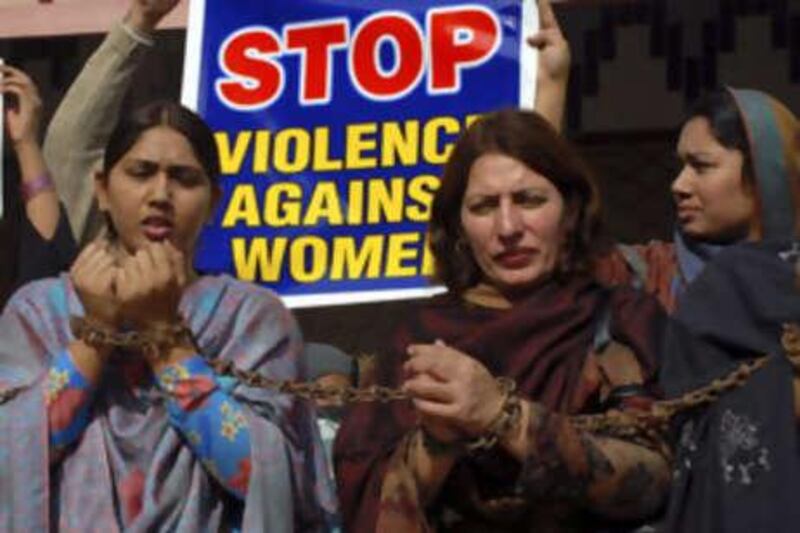ISLAMABAD // The Pakistan government's reluctance to embrace proposals to grant women greater divorce rights further undermines the purported pro-woman credentials of the ruling party once led by Benazir Bhutto, according to analysts and activists. The government's distancing of itself from the proposals comes on the tail of promotions to the federal cabinet of two parliamentarians who have publicly defended "honour killings", a tradition of family members killing women perceived to have shamed their family. Their appointment to the new mega-cabinet of 61 ministers in the Pakistan People's Party government has stunned and infuriated human rights groups, who said it runs counter to Ms Bhutto's legacy. Two weeks ago, the Council of Islamic Ideology, the country's top advisory body on religious affairs, proposed that a divorce should come into effect within 90 days of a woman's filed request, even if her husband has not responded by that time. Pakistan's current law allows a woman to start divorce proceedings only if she first surrenders her right to "mehr", or money pledged by her husband at the time of marriage. Existing laws allow a husband to divorce his wife verbally in private. The council recommended it should be done in writing. After a storm of angry criticism by religious parties branding the proposals an attempt to change Islamic law, the government disowned the council's recommendations. "It was not the decision or viewpoint of the government, but that of the members of the Council of Islamic Ideology," Hamid Saeed Kazmi, the religious affairs minister, told the parliament. On Monday, Farooq Naek, the law minister, said he had asked the council to "provide us the basis of its recommendations". To reject the proposals would be "unfortunate", said Rasul Bakhsh Rais, an analyst and professor of political science at the Lahore University of Management Sciences. "It speaks volumes about the character and quality of our political leadership. It shows that they don't like to do anything for women. Anyone who rejects these proposals cannot present a very sound argument for doing so." Shafqat Mahmood, a columnist, said the stance made a mockery of the PPP's "liberal" credentials. "It was great to see the 'liberal' PPP disowning the very progressive and pro-women recommendations made by the Council of Islamic Ideology," he wrote in The News, a daily newspaper. "This should not come as a surprise to anyone considering that it has elevated two famous supporters of women, Zehri and Bijarani, to the federal cabinet." Hazar Khan Bijarani, the education minister, is accused of chairing a 2006 "jirga" (traditional tribal council) that ordered the handover of five girls aged between two to five as compensation to settle a dispute, under a tribal tradition known as "vani" or "swara". Israrullah Zehri, a legislator, defended reports that three to five women had been buried alive in the deserts of Balochistan province as an honour punishment. Amid outrage over reports of the live-burial honour punishments, Mr Zehri vowed in the Senate to defend "these centuries-old traditions. Only those who indulge in immoral acts should be afraid." The Aurat Foundation, a leading women's rights organisation, is leading a campaign to have the two men removed from cabinet, staging protest marches, lobbying individual MPs and sending petitions to Asif Ali Zardari, the president and Bhutto's widower, and Yusaf Raza Gilani, the prime minister. "The whole of civil society is outraged at the government's audacity and insensitivity to not only accept these people to stay within the parliament, but to elevate them to positions of power," said Maliha Zia, the national co-ordinator for the foundation. "It is an outrage because those men are standing there and effectively saying 'we can kill women' and the government is OK with that. In fact they have given blanket approval, which is shocking, horrendous and completely unacceptable not just to civil society but to the whole of humanity. "When you go and appoint two ministers who are so openly opposed not just to women's rights but to women's lives, it underwrites everything done by the PPP government, which says that it's doing all these pro-women activities." A quarterly report by Aurat recorded 143 cases of honour killings nationwide in the third quarter of 2008, among 2,531 incidents of violence against women in the same period. Ms Zia said Aurat had for years campaigned "to make divorce easier for women" and would embrace any legal amendments in that direction. Mr Rais said that although every Pakistani government tries to project itself as the "one who is supportive of the causes of women's uplift and development", the former government of Pervez Musharraf "did more than any recent government towards women's empowerment". "If you look at the higher institutions of the state we see more women being represented and that came with Musharraf giving more representation to women in the parliament. If we compare how many women ministers are in the present government with the previous government, the record may not show up well for the PPP." "You have to separate political rhetoric from the facts." bcurran@thenational.ae
Pakistan disowns divorce reform
The Pakistan government's reluctance to broaden women's rights to walk out of marriage runs counter to Benazir Bhutto's legacy.

Editor's picks
More from the national




